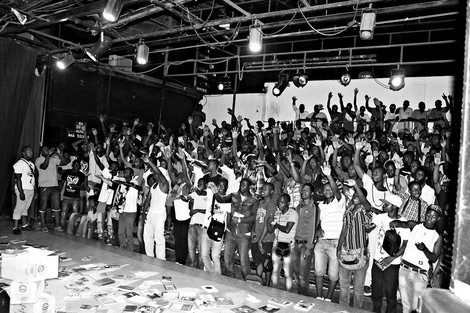Your podcast discovery platform
Curious minds select the most fascinating podcasts from around the world. Discover hand-piqd audio recommendations on your favorite topics.

piqer for: Global finds
Ciku Kimeria is a Kenyan author "Of goats and poisoned oranges" - (https://www.amazon.com/goats-poisoned-oranges-Ciku-Kimeria-ebook/dp/B00HBBWPI6), development consultant, adventurer and travel blogger (www.thekenyanexplorer.com). She writes both fiction and non-fiction focusing on African stories that need telling. She has worked on diverse pieces for various international and local publications including Quartz, Ozy, The East African etc. She has travelled to 45 countries – 16 of them in Africa. 153 countries to go and 63 territories!
"Of goats and poisoned oranges" has been extremely well received in Kenya and beyond. It tells the story of a Kenyan middle aged power couple and their complicated marriage. The novel explores issues of greed, revenge, betrayal and murder. It runs from the 1960s to 2013. It has been described as “Wicked, funny, poignant, wacky, human, a big ball of fun and danger”, “A unique and captivating book”, “Fun and intriguing”, “Impossible to put down once you start reading.”
She recently moved to Dakar, Senegal from Kenya to work on her second novel. She also works at as the Africa Communication Manager at a leading global strategy consulting firm.
She holds a B.S. in Management Science from MIT with minors in Urban Planning and International development studies.
Hiphop In Angola And Its Fight Against An Oppressive Regime
The power of music cannot be overstated. As a Kenyan, I remember clearly the feeling in 2002 when the opposition parties all merged together to unseat President Daniel Arap Moi who had ruled my country with an iron fist for 24 years. He was so feared that, even as a child, I knew never to talk about politics in public. Rumors abounded that he was invincible, would never die, could sniff rebellion even before it happened. The soundtrack to his defeat was Gidigidi Majimaji's Unbwogable.
Angola has had an even tougher run than Kenya. Having gained independence from the Portuguese only in 1975, having survived a bloody civil war, experimentation with socialism, the country has now been under the rule of President Dos Santos (and family) for the past 38 years. Angola's capital, Luanda, is one of the most expensive cities in the world, with the highest rates of inequality. Dos Santos' daughter is the richest African woman, and his family runs most of the country and its industries.
Rap helps the population express their dissent, but they are still tied to operating in a system where absolute power rests with a few.
Aspiring artists have no option but to submit to the elite clique that distributes licenses for open-air shows, annual festivals, and other mainstream events. Those who make their diverging opinions known too vehemently are barred from these formal stages.
For the musicians and the fans, expressing this dissent comes at a great personal risk.
Everyone remembers the fate of the young man who was idly washing a car, humming anti-establishment lyrics, and who was overheard by members of the presidential guard. They took him to a beach nearby and drowned him in the Atlantic.
That murder took place in 2003, and the song in question was written by MCK, a skinny, bespectacled rapper with a philosophy degree. In recent years, MCK has become the figurehead of rap de intervenção. His lyrics explicitly call for the political awakening of his listeners.
